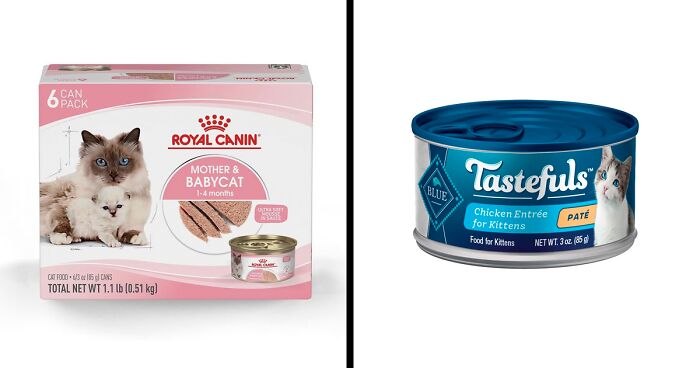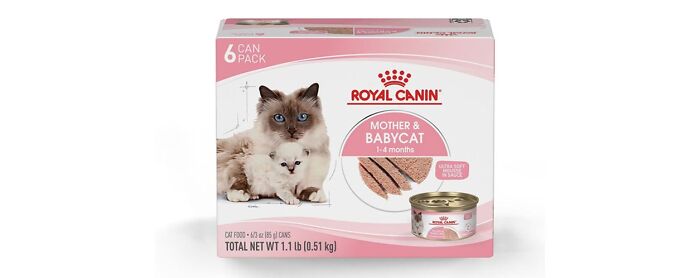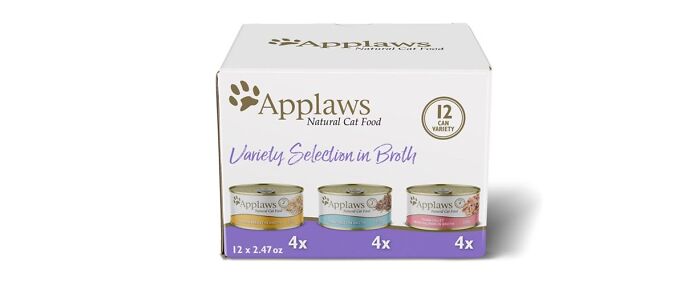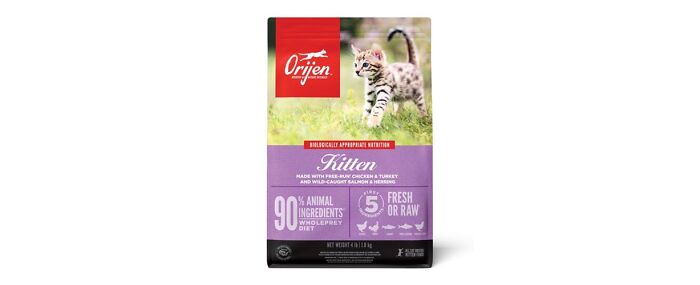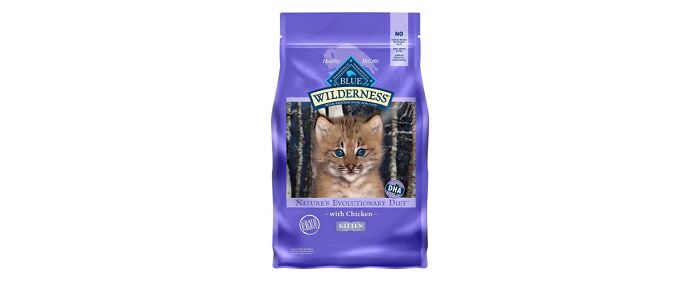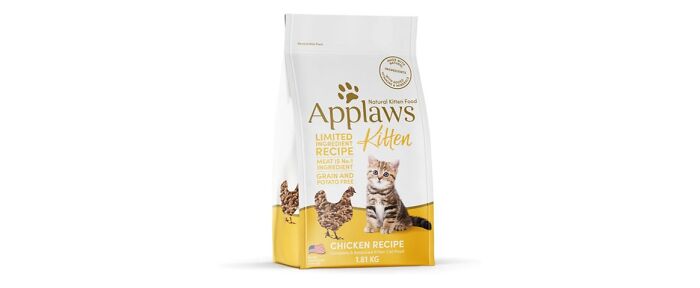Bringing a tiny kitten into your home is an exciting moment. However, as soon as you step inside your house, you are faced with an important decision: what food to give your tiny furball. The type of food you provide for your kitten plays a crucial role in their development, activity level, and overall temperament. 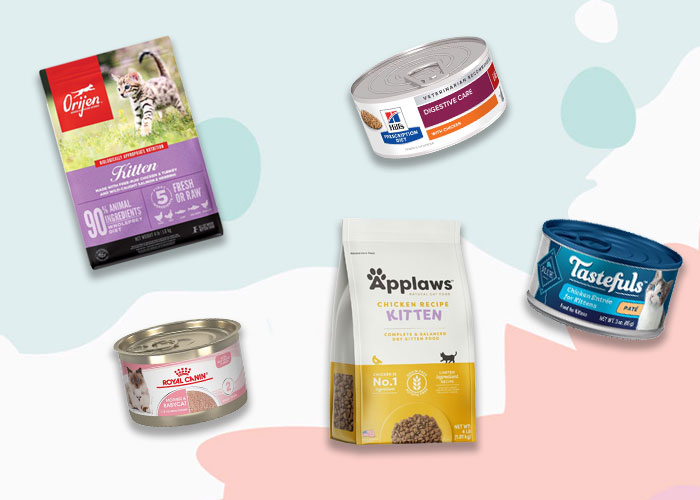
We’ve come a long way when it comes to the pet food available on our shelves and online, and there is a vast array of healthy and nutritious options for the conscious owner. However, with so many kitten foods on the market, knowing which one suit best to your pet can be a tough decision.
To help you make a more informed choice, we at Bored Panda asked our vet expert, Dr. Linda Simon, to share her insights on the best dry and wet foods available. Read on to learn more about choosing the optimal kitten food for your bundle of joy.
The information provided herein is for informational purposes only. Please refer to our disclaimer for more details.
Things to Know Before Choosing Kitten Food
Before we dive in, it’s important to note that there is no one “best” food for animals, as their ideal diet should be tailored to their unique needs. However, one thing that applies to all felines is they are obligate carnivores and should be fed a meat-based diet as soon as we wean them from their mother (3-4 weeks of age).
Type of food: You have to decide whether to provide your kitten with wet or dry food or if you’d rather give it mixed feed.
Underlying health conditions. Most little kittens are typically healthy and won't face any medical issues. However, some may experience problems such as ongoing diarrhea, which should be considered when determining their nutritional requirements.
Cat’s breed. A kitten’s breed can affect its protein needs. Larger and more active breeds, such as the Maine Coon, Savannah, and Siberian, typically require higher protein levels.
Protein. We want to ensure the product contains balanced fatty acids and essential vitamins and minerals from a fresh protein source, such as chicken or fish. DHA (omega-3 fatty acid found in cold water and fatty fish such as salmon) is critical for brain and eye development during the first months.
Carbohydrates. Carbs are a good energy source, but excessive consumption can result in health problems such as obesity and diabetes.
Best Wet Kitten Food
Wet food is an excellent option for younger cats. It’s easy to chew and digest, and the high moisture content helps to flush out the kidneys and bladder. Additionally, it can help improve hydration levels, which is especially important for cats prone to vomiting or diarrhea.
This post may include affiliate links.
Royal Canin Mother and Baby Cat Mousse
Discovering the ideal food that can smoothly transition kittens into solid food can be daunting, but this velvety mousse is a real game-changer. Offering a high-quality diet that is easy for newborns to consume and pleasurable for nursing cats, this mousse is also enriched with calcium, which is excellent for nursing cats.
At just 3 to 4 weeks old, you can leave a bowl next to a shallow water dish when starting the weaning process. If the kittens aren't interested, you can brush a bit onto their paws, and they’ll usually begin to lick it off. Once they taste the delicious mousse, they’ll return for more in no time.
What we like:
• Prebiotics to promote healthy gut
• Ideal for small mouths and soft teeth
• Rich in antioxidants for a robust immune system
What we don't like:
• Premium price tag
Blue Buffalo Tastefuls Natural Kitten Pate
Blue Buffalo pate is perfect for your growing kitten as it contains a staggering 50% protein (chicken) on a dry matter basis, which helps develop your kitten’s skeleton and muscles. The sweet potato and brown rice in this wet food are highly digestible and should be well tolerated by most kittens.
These little, juicy bites in this meal are perfect even for tiny kittens, and their yummy recipe guarantees they’ll lick their bowls clean. The best part? It’s recognized by the Association of American Feed Control Officials (AAFCO) as a complete and balanced diet, so no need to add anything else to their meal.
What we like:
• Rich in protein
• Highly palatable
• Good moisture content
What we don't like:
• It isn't suitable for those following a grain-free diet
Applaws Variety Selection in Broth
Applaws canned selection is widely known for its delicious taste. It is often the preferred choice when a cat isn't eating enough, like kittens recovering from surgery or with a poor appetite.
The best part is that it can be effortlessly mixed with a cat’s regular diet, encouraging them to eat when they might otherwise refuse. Additionally, kittens find Applaws food easy to consume, and tuna variety provides a natural source of omega-3 fatty acids.
What we like:
• Perfect as a topper or a treat
• It can help to get a fussy cat eating
• The broth boosts hydration levels
What we don't like:
• Not a complete food
Best Dry Kitten Food
Many owners prefer a dry food option, especially if their cats are messy eaters or have long fur. However, dry foods may not be the best option for kitties who aren't big drinkers and who can be prone to dehydration.
Orijen Grain-Free Dry Kitten Food
If you’re looking for quality cat food suitable for all life stages, we recommend Orijen. While pricier than other brands, the peace of mind that comes with knowing your feline companion is getting a nutritious diet is well worth it.
Orijen’s kibble contains 90% animal-based ingredients, including wild-caught fish and free-run poultry with delicious freeze-dried liver pieces. However, what truly sets Orijen apart is the added fiber, prebiotics, and probiotics that promote digestive health and support a robust immune system.
What we like:
• 90% animal-derived ingredients
• Responsibly sourced ingredients
• Freeze-dried liver pieces for extra flavour
• 40% protein for optimal muscle development
• Enriched with both pre and probiotics
What we don't like:
• A more expensive option
Purina Pro Plan Kitten Shredded Blend
Purina Pro Plan Kitten Shredded Blend is an excellent food for most kittens. It can be fed to kitties up to 12 months of age and supports healthy growth and development. Compared to adult food, it contains higher levels of calories and calcium, essential for appropriate skeletal and tooth development.
While the main ingredient is chicken, this kibble also contains meat by-products and soybean meal, which may make it less digestible than other meals with fewer ingredients. However, for most healthy kittens, this will be a suitable option. Plus, it comes at a better price overall.
What we like:
• Available in three-size bags
• Contains live probiotics for optimal gut health
• Crunchy texture promotes good dental hygiene
• Great value
What we don't like:
• Some more sensitive kitties may not tolerate lower-quality ingredients
Blue Wilderness High-Protein Dry Kibble
For good reason, Blue Wilderness has earned an outstanding reputation among the cat owner community. They offer a wide range of kitten recipes and are known for producing tasty, grain-free options.
Blue Wilderness High Protein Dry Kibble is an impressive choice for dry kitten food, boasting 40% protein content. It features both chicken and fish meals, making it a cost-effective option. This kibble is ideal for most cats, and its high protein content makes it a perfect fit for more muscular cat breeds like the Bengal.
What we like:
• High protein content
• Grain-free
• Cold-formed for better bio-availability
What we don't like:
• It contains meat and fish meal
Best Kitten Food for Picky Eaters
It’s natural to be concerned if your kitten is eating less or not interested in food. However, keep in mind that it is common for their appetite to vary. Your kitten may require less food on days when they are less active or when your kitten reaches five or six months of age, and their growth rate slows down significantly.
Applaws Complete Chicken Recipe for Kittens
Applaws Complete Chicken Recipe is grain-free and contains protein sources such as chicken, peas, lentils, and eggs. It can be a good option for cats with a sensitive stomach or chronic skin issues.
The kibble has meat as the primary ingredient and no artificial flavors or preservatives. It is a well-rounded meal that will fulfill all of your kitten’s nutritional needs.
Tip: Enhance the chicken flavor and aroma of the food by mixing it with warm water to create a delicious gravy.
What we like:
• A complete diet with all-natural ingredients
• Suitable for those with food sensitivities or allergies
• High-quality protein source
What we don't like:
• Costly if fed exclusively
Sheba Perfect Portions Kitten Variety Pack
The Sheba Kitten Variety Pack is an excellent solution for those who want to make their life easier. It comes in convenient “perfect portion” trays that are easy to handle. You can get a multi-pack that contains both the salmon and chicken flavors, allowing you to find out which one your beloved kitten prefers.
This meal is complete and balanced, providing all the essential nutrients for your kitten’s growth and development. It can be fed as the sole diet or mixed with dry food. Keep in mind that it does contain poultry by-products, but it also has plenty of protein to meet your kitten’s nutritional requirements.
What we like:
• Soft and delicate texture
• Highly palatable
• Complete nutrition
• Comes perfectly portioned
What we don't like:
• Not the highest quality ingredients
• Plastic containers
Best Kitten Food for Sensitive Stomach
It’s common for kittens to experience stomach issues caused by various factors such as moving homes, car travel, infections, and parasites. Your vet may suggest a treatment plan that involves a sensitive diet, which can be administered for a few days or recommended as a long-term solution to help your kitten feel better.
Hill’s Prescription Diet I/D Digestive Care
Hill’s Prescription Diet is a specialized pet food that caters to the medical needs of cats. Their I/D range has undergone rigorous clinical testing and is suitable for kittens and cats of all ages. Depending on your cat’s preferences, you can choose from dry or wet food options.
If your kitten suffers from a sensitive stomach, we recommend you try the wet food option—the moisture in wet food aids in replenishing the fluids lost during vomiting or diarrhea. Additionally, kittens with a lower appetite are more likely to prefer wet food over dry food.
What we like:
• Vet-developed and recommended
• Proven solution for upset stomachs
• Extremely palatable
What we don't like:
• It costs more than regular cat food
Royal Canin Gastrointestinal Ultra Soft Mousse
Hill’s Prescription Diet is a specialized pet food that caters to the medical needs of cats. Their i/d range has undergone rigorous clinical testing and is suitable for kittens and cats of all ages. Depending on your cat’s preferences, you can choose from dry or wet food options.
If your kitten suffers from a sensitive stomach, we recommend you try the wet food option—the moisture in wet food aids in replenishing the fluids lost during vomiting or diarrhea. Additionally, kittens with a lower appetite are more likely to prefer wet food over dry food.
What we like:
• Vet-developed and recommended
• Proven solution for upset stomachs
• Extremely palatable
What we don't like:
• It costs more than regular cat food
Things to Know Before Choosing Kitten Food
Before we dive in, it’s important to note that there is no one “best” food for animals, as their ideal diet should be tailored to their unique needs. However, one thing that applies to all felines is they are obligate carnivores and should be fed a meat-based diet as soon as we wean them from their mother (3-4 weeks of age).
Type of food: You have to decide whether to provide your kitten with wet or dry food or if you’d rather give it mixed feed.
Underlying health conditions. Most little kittens are typically healthy and won't face any medical issues. However, some may experience problems such as ongoing diarrhea, which should be considered when determining their nutritional requirements.
Cat’s breed. A kitten’s breed can affect its protein needs. Larger and more active breeds, such as the Maine Coon, Savannah, and Siberian, typically require higher protein levels.
Protein. We want to ensure the product contains balanced fatty acids and essential vitamins and minerals from a fresh protein source, such as chicken or fish. DHA (omega-3 fatty acid found in cold water and fatty fish such as salmon) is critical for brain and eye development during the first months.
Carbohydrates. Carbs are a good energy source, but excessive consumption can result in health problems such as obesity and diabetes.
FAQ
How Long to Feed Your Cat Kitten Food?
Feeding your kitten with a specific diet that caters to their nutritional needs until they’re almost a year old and a few months longer for larger breeds is essential. You can offer dry and wet kitten foods, but never give them adult cat food as it won't be nutritionally appropriate.
How Much Should a Kitten Eat?
Each food has a different nutritional profile and amount of calories, so owners need to follow the feeding guidelines on the packet, which depend on the kitten’s weight and age and change as they grow.
How to Transition from Kitten Food to Adult Cat Food
It’s important to gradually transition to new cat food over several days to avoid stomach issues. Begin by giving kitten food and adding 10-20% adult food on the first day.
As long as your cat can tolerate the change, increase the new food daily while decreasing the kitten food. Your cat should have adapted to the new food by the fifth day. However, if your cat experiences stomach discomfort, it’s best to slow the transition to a few weeks.
Can Kittens Eat the Same Food as Adult Cats?
Under no circumstances should we offer adult cat food to our kitten. It could lead to improper development and nutritional deficiencies. As responsible owners, we must ensure that our kitten gets the proper diet for their life stage.
Can I Prepare Kitten Food at Home?
Preparing a homemade diet for your kitten may seem like a good idea, but it’s pretty challenging to get it right. Unless you’re working with a nutritionist, creating a balanced diet that meets your kitten’s nutritional needs is difficult. Most recipes found online are incomplete and may not provide the necessary nutrients.

 Dark Mode
Dark Mode 

 No fees, cancel anytime
No fees, cancel anytime 


